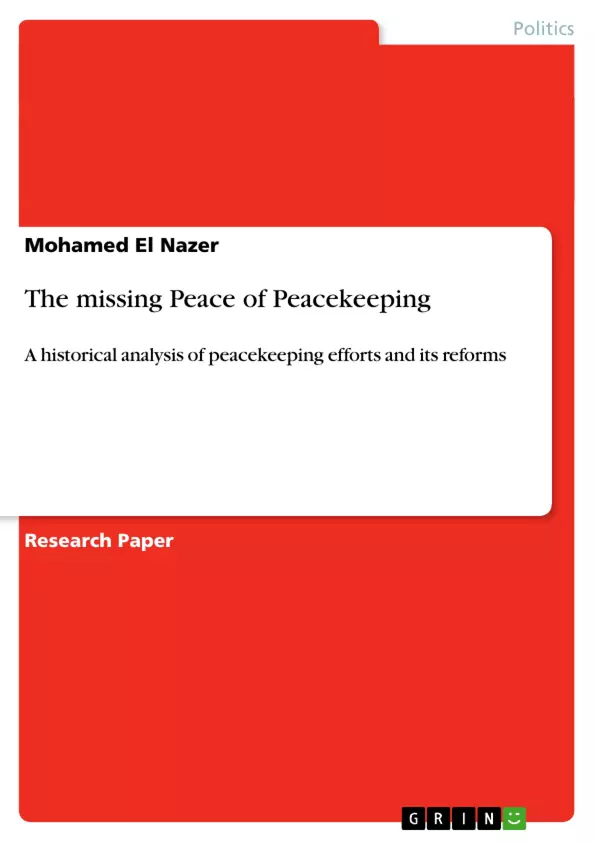The early effort for the United Nations to start the Peacekeeping mission was in 1948, when the United Nations authorized the deployment of troops in the Middle East to maintain peace and security. The mission’s intent was to supervise on the Armistice agreement made by Israel and Arab countries during the Arab Israeli conflict. It was crucial time for the United Nations to deploy its military personnel for several reasons. It was the second stage of the Palestinian war, preceded by domestic unrest and civil war between the Palestinians and the Jewish people as a result of the UN 1947 partition plan.
Inhaltsverzeichnis (Table of Contents)
- The Early Years of Peacekeeping
- The Post-Cold War Surge
- The Reform Era
- The Case of Yugoslavia
- The Case of Somalia
- The Case of Rwanda
Zielsetzung und Themenschwerpunkte (Objectives and Key Themes)
This paper examines the history of United Nations peacekeeping operations, focusing on their evolution and the challenges they have faced. It aims to provide a critical analysis of the effectiveness of peacekeeping efforts, particularly during the post-Cold War period. The key themes explored in this paper are:- The evolution of peacekeeping missions from cease-fire enforcement to more complex peacebuilding endeavors.
- The challenges of peacekeeping in complex conflict environments, especially during periods of state failure and ethnic violence.
- The failures of peacekeeping operations in specific cases, such as Yugoslavia, Somalia, and Rwanda, and the lessons learned from these experiences.
- The need for reform and restructuring of peacekeeping operations to enhance their effectiveness and address the changing nature of conflict.
Zusammenfassung der Kapitel (Chapter Summaries)
The paper begins by outlining the early efforts of the United Nations in peacekeeping, highlighting its first three operations in the Middle East, India-Pakistan, and Korea. These early operations focused primarily on cease-fire agreements. The next section delves into the "post-Cold War Surge" and the significant increase in peacekeeping operations during the 1990s. It analyzes the reasons behind this surge and discusses the successes and failures of various peacekeeping missions during this period. The paper then focuses on the "Reform Era" of peacekeeping, examining the calls for restructuring and enhancing the effectiveness of UN peacekeeping missions. It explores the reasons behind these calls, including the failures in Yugoslavia, Somalia, and Rwanda. The paper goes into detail about the conflict in Yugoslavia, highlighting the role of the United Nations in mediating a ceasefire and attempting to prevent further conflict. It discusses the challenges of peacekeeping in the face of ethnic cleansing and the difficulty of imposing a peace agreement. The paper then examines the case of Somalia, analyzing the failures of UN peacekeeping efforts to stabilize the country and prevent state collapse. It focuses on the humanitarian crisis in Somalia and the difficulties of providing aid in the face of violence and instability. Finally, the paper explores the Rwandan genocide, highlighting the devastating consequences of political and ethnic conflict. It discusses the failures of the international community, including the United Nations, to prevent the genocide and the need for better early warning and response mechanisms.Schlüsselwörter (Keywords)
This paper examines the historical evolution of United Nations peacekeeping operations. It explores key concepts such as state failure, ethnic conflict, peacebuilding, humanitarian intervention, and the challenges of managing complex conflict environments. The paper also highlights the failures of peacekeeping operations in specific cases, such as Yugoslavia, Somalia, and Rwanda, and the need for reform and restructuring to enhance their effectiveness.Frequently Asked Questions
When did UN Peacekeeping operations begin?
The first mission was authorized in 1948 to supervise the Armistice agreement between Israel and Arab countries in the Middle East.
What was the "Post-Cold War Surge" in peacekeeping?
It refers to the significant increase in the number and complexity of UN missions during the 1990s following the end of the Cold War.
Why are the cases of Yugoslavia, Somalia, and Rwanda significant?
These cases are highlighted as major failures of the international community to prevent ethnic cleansing, state collapse, and genocide, leading to calls for UN reform.
What is the difference between cease-fire enforcement and peacebuilding?
Early missions focused on monitoring cease-fires, while modern peacebuilding involves complex efforts to rebuild state institutions and social fabric.
What is the "Reform Era" of peacekeeping?
It is a period focused on restructuring UN operations to better handle complex conflict environments and improve early warning mechanisms.
- Citar trabajo
- Mohamed El Nazer (Autor), 2012, The missing Peace of Peacekeeping, Múnich, GRIN Verlag, https://www.grin.com/document/208045



